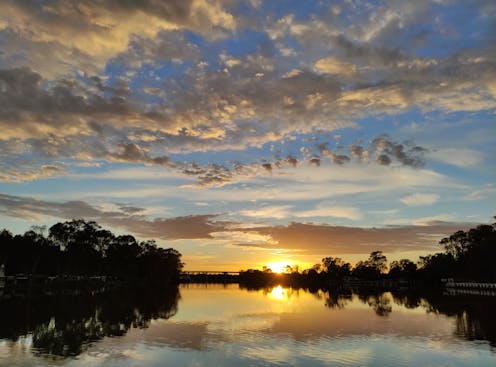Labor’s new Murray-Darling Basin Plan deal entrenches water injustice for First Nations
- Written by Grant Rigney, Indigenous Knowledge

The federal government has struck a new deal with most of the states in the nation’s largest river system. The agreement, announced last week, extends the $13 billion 2012 Murray-Darling Basin Plan to rebalance water allocated to the environment, irrigators and other uses.
Environment and Water Minister Tanya Plibersek said the government has:
negotiated a way to ensure there is secure and reliable water for communities, agriculture, industry, First Nations and the environment.
But there is no mention of water for First Nations in the agreement. This follows a history of Indigenous peoples being shortchanged by Murray-Darling Basin planning. Yet again, this latest deal ignores First Nations’ interests, despite millennia of custodianship.
Shortchanged in reforms
The Murray-Darling Basin Plan was agreed in 2012 to try and improve the health of the largest and most complex river system in Australia.
It was a historic compromise that sought to address the often conflicting demands of states, irrigators and the environment. But the plan overlooked First Nations rights to own, manage and control water on Country. The plan’s current provisions include only weak requirements for governments to “have regard to” First Nations values and uses.
In 2018 the Turnbull government put $40 million on the table for First Nations. This deal offered a glimmer of hope as it saw the then water minister David Littleproud and Labor water spokesperson Tony Burke commit the funds to support Basin First Nations’ investment in cultural and economic water entitlements.
But despite Labor renewing the commitment as part of its 2022 election platform, the money remains with government and has not been spent. Last week, Plibersek said that when Labor came into government there was “very little work done about how this might happen”, and that “it is proceeding”.
A commitment of $40 million is also a paltry amount in the context of the wider river basin. Water research firm Aither’s 2023 Water Market Report estimates the total value of water entitlements in the southern basin as $32.3 billion, so the government commitment of $40 million is only 0.1% of the total.
Read more: Water injustice runs deep in Australia. Fixing it means handing control to First Nations
Shortchanged in the market
First Nations organisations have maintained pressure on the federal government and attempted to hold successive ministers to account for unnecessary delays in delivering the funding.
These delays mean the committed funds are decreasing in value.
When Littleproud initially committed the $40 million, the money was equally split between the northern and southern regions of the basin. Aither analysis conducted for the Murray Lower Darling Rivers Indigenous Nations shows at today’s prices, the $20 million for Nations in the southern basin can only buy two-thirds of the water that could have been acquired in 2018. In 2023, buying the same volume of water that could have been purchased in 2018 will cost almost $11 million more.
A fair go: investment and reform needed
Limited government investment from other sources has supported some Basin First Nations to develop plans that could guide water use, to nourish their Country, maintain culture, and generate sustainable livelihoods.
However, realising these opportunities means they need water. In an overallocated river system, amid water scarcity and rising prices, this requires genuine political will coupled with necessary reforms and adequate funding.
As another drought looms, and water entitlement prices remain high, more than 40 Basin Nations must share very limited funding that can only acquire a tiny – and diminishing – fraction of their water needs. These deals demonstrate sustained and systemic bipartisan political indifference to First Nations’ inherent rights.
If Plibersek is sincere about delivering “secure and reliable water” for First Nations, she must listen to First Nations people, and actually deliver tangible outcomes. Governments must urgently commit adequate funding for First Nations in the basin to secure water that meets our needs, before future generations are priced out of the market forever.
Funding for cultural flows must be coupled with reform to transform the foundations of water governance and implement the Echuca Declaration. This declaration establishes cultural flows as the “inherent rights” of all First Nations in the Basin.
As a start, the Water Act 2007 needs to be strengthened to enshrine Basin Nations’ authority and ensure their voices are heard.
As the terms of the basin plan implementation are being reassessed and renegotiated, governments have an opportunity not only to listen, but also to deal First Nations in.
Authors: Grant Rigney, Indigenous Knowledge




